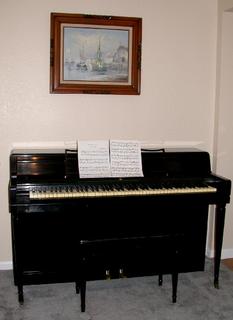Moving a piano
 Yesterday I called up my one friend who has a pickup truck. We have asked him and his truck favors before, hauling compost, moving all of our belongings into this house, and more, and we definitely owe him dinner for this one.
Yesterday I called up my one friend who has a pickup truck. We have asked him and his truck favors before, hauling compost, moving all of our belongings into this house, and more, and we definitely owe him dinner for this one. We all piled in his truck and headed over to the see the folks who sold us the piano. Mrs. Piano Seller was out, but Mr. Piano Seller was around and he allowed us to use his furniture dollies and tape measure. He had also been a scoutmaster and spent some time in the navy, so he had a few opinions about how to secure the piano once we hoisted it into the truck. Four engineers can come up with a few opinions about hoisting a piano into a pickup truck, too. In the end, we got it home and in place with a combination of careful ingenuity and brute force, but we did get it home safely.
They got rid of it because the kids are grown and out of the house, and because they want the space for something else now. They thought about giving it to the church, and at the price we paid, it's practically a donation to me, instead. I may never be a great pianist, but I will give it a good home, I promise. I think the piano was built in the 1950s, and the seller and the user manual that was in the piano bench both suggest the same.
I have not played piano regularly in ten years, and I don't remember everything, though it's coming back quickly. I have always read treble clef well, since I also play flute, but my ability to read bass clef, once servicable, was pretty rusty, particularly for lower notes. Oddly, I found it easier to read chords than individual notes, probably because the intervals offered more hints.
The other difficulty I have encountered already is that I have very little sheet music. When I played piano before, it was my dad's piano, and he has loads of sheet music. I will have to go borrow and copy some of my favorites and copy them, and start exploring the music repositories online. It will start to sound better when both the piano and the pianist are in tune.

0 Comments:
Post a Comment
<< Home